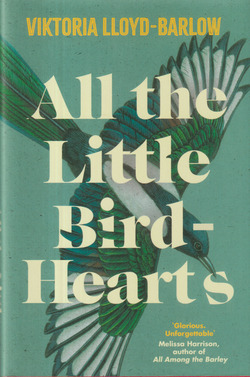Viktoria Lloyd-Barlow’s All the Little Bird-Hearts (2023) follows an account of one memorable summer that irreparably changed its narrator’s life, Sunday, is an autistic woman with notable quirks: she enjoys white food; is advised by a 1950s handbook on social etiquette; and finds comfort in a book on Sicilian folk tales. She lives in the Lake District, in her old family home, with her daughter, Dolores, a young woman weaned on this bland lifestyle and in search of her independence. The book’s setting – mid-80s – harks to a time when knowledge of autism was less mainstream or medically understood, and seems therefore the perfect choice to show how Sunday navigates this affliction.
The centre of generational contempt – her late mother disdained her odd behaviour and her daughter now finds her boring – Sunday’s life is, in spite of her ambitions quiet, and withdrawn, often the easiest and stress free way in a society rife with unspoken rules and expectations of behaviour. Her interactions with people can be a struggle, slowing her down as she attempts to interpret fairly innocuous banter but also, in her innocence, she’s too trusting, takes words literally, and doesn’t see the social cues around her.
Into this structured world, comes Vita and Rollo, a well-to-do childless couple from London, holidaying at a nearby home. Their carefree attitude is the antithesis of everything Sunday stands for but is also alluring. Vita is instantly attractive, aspirationally, to Sunday, and the befriending feels like a dream come true among many unrealised dreams (“the fury of unmet wanting”). However, as an unreliable narrator, Sunday’s inability to see what’s really happening around her is at the heart of the drama as, while she fauns over Vita, Dolores is also taken by the new neighbour, and the powerplay that arises is one she can’t possibly command.
As a name, Sunday is evocative of a quiet, dull day, and it’s perhaps no surprise that Vita (“she crafted conversation by herself from nothing”; “she expected to be admired and did not, therefore, seek it”) represents the vitality seemingly missing from Sunday’s existence. She’s “a person-shaped precious stone, something mined and brought up to the surface to live among the pebbles, a shiny reminder of our comparative dullness.” and she is the antithesis of Sunday’s cautiousness; a free spirit living an entitled life. Ultimately she’s all artifice and ulterior motives versus Sunday’s genuine, loving and purer nature. As she and Rollo ingratiate themselves into Sunday’s ordered life, creating disruption that Sunday can’t see coming even through such unaccommodating acts of serving food she can’t eat because it’s not white.
Overall, I found reading this book a strange and frustrating experience. I could see how its varied metaphors tied in with its story; where observations or the aforementioned folk tales provided foreshadowing; and there’s many a great description or turn of phrase. But what few events there are in this slow story become somewhat repetitive while the destination is predictable, although my biggest personal issue with the book is that it did nothing to surprise, excite, or otherwise engage. It may well be the point, in reflecting Sunday’s worldview (“Those like me swim on, unaffected by the change in currents around them”) but there’s clearly a story there to be read between the lines that I also felt failed to deliver. Even when it feels like it could be leaning toward some greater mystery it plods on at its singular pace, lethargic but literary.
At its heart, it’s an exploration of a mother and daughter relationship through an autistic lens. The love Sunday has for her daughter shines through, but the unaffected view of Dolores, at both an impressionable age and unable to understand her mother’s predicament, ensures they are destined to drift. Birds eventually leave the nest. It may never not be wounding, but the manner in which Sunday struggles to comprehend it is figuratively fatal. When the end comes, in a rushed epilogue set in the early 90s, events are tied up, the intervening years recounted, and life goes on, however we may see and experience it.
